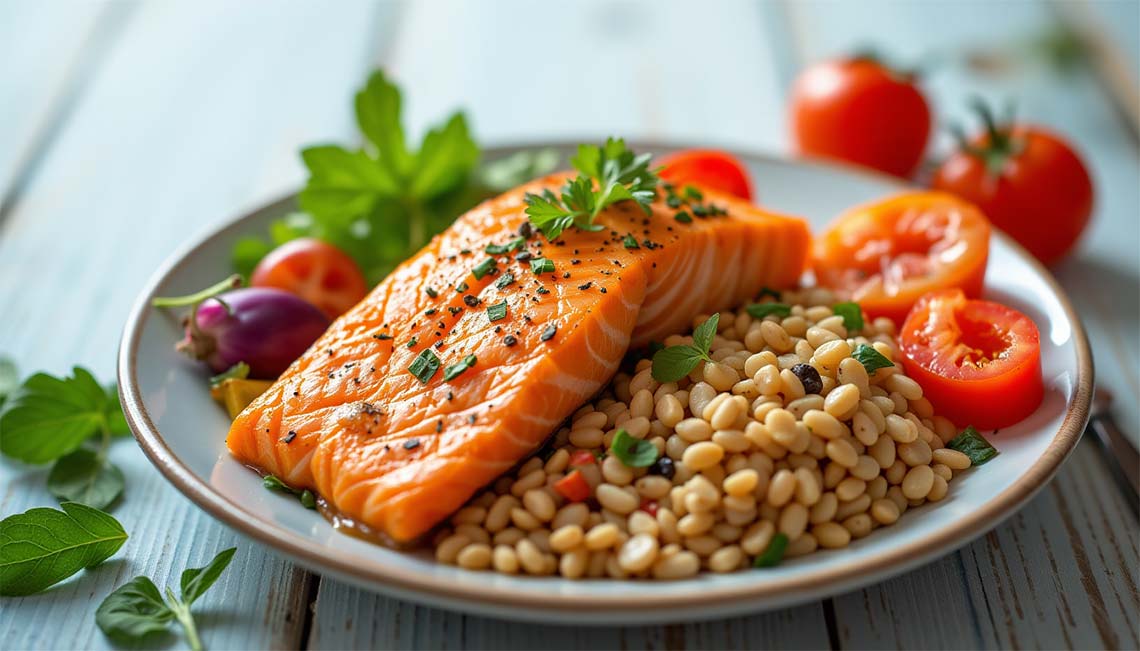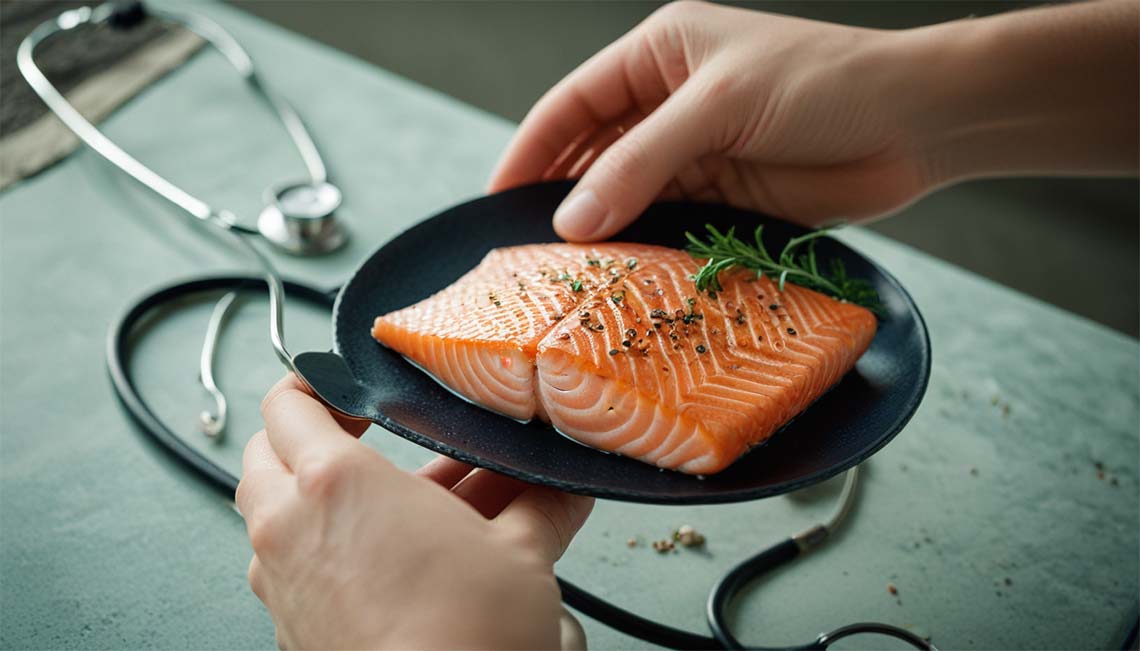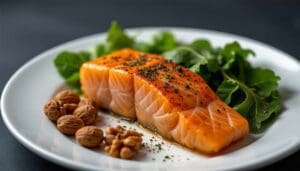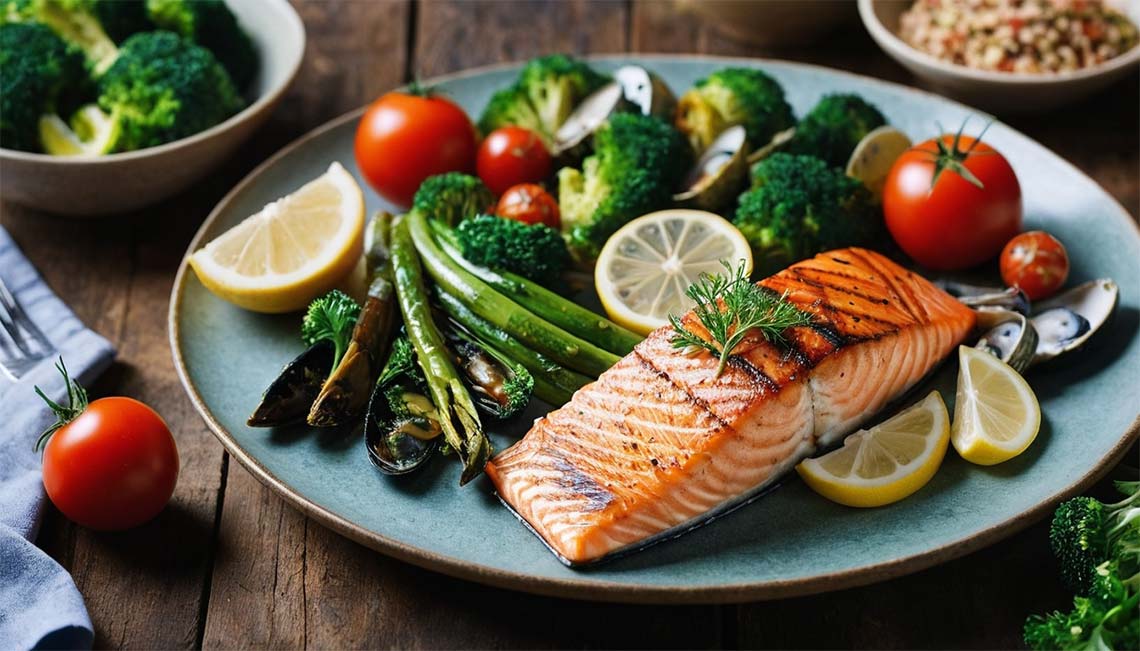In recent years, the growing awareness of health and wellness has highlighted the numerous benefits of a high-protein diet, particularly one that includes omega-3-rich foods, such as fish. Across the globe, nations that traditionally consume a diet abundant in fish have long reaped the health benefits of this nutritional powerhouse. Omega-3 fatty acids, predominantly found in fish like salmon, mackerel, and sardines, play a crucial role in heart health, boosting brain functionality and reducing inflammation. Incorporating omega-3-rich foods into a high-protein diet enhances these benefits and supports muscle-building and weight management – factors essential for long-term health and vitality.
Cultures that rely heavily on fish as a staple, such as the Japanese and Mediterranean populations, exhibit lower rates of heart disease and obesity. Their diets, rich in high-quality protein and essential fatty acids, create a harmonious balance that supports a robust cardiovascular system and a healthier lifestyle. Fish’s high protein content helps to maintain lean muscle mass and provides long-lasting energy, making it an excellent dietary choice for active individuals seeking improved performance and recovery.
Furthermore, fish’s health benefits extend to enhancing mental well-being due to the role of omega-3s in brain health. Regular consumption of these fatty acids has been linked to reduced risks of depression and cognitive decline. By embracing a high-protein diet centred around fish, individuals can cultivate vibrant health and longevity, following in the footsteps of the world’s healthiest populations.

What Makes Fish and Seafood Good For a High-Protein Diet
Fish and seafood contain high-quality protein, essential omega-3 fatty acids, and vitamins and minerals. Here’s a closer look at what you can gain from different types of seafood:
Protein Content:

Fish and seafood are rich in lean protein, essential for muscle repair, immune function, and overall health. A typical serving of salmon or tuna can provide 20-25 grams of protein.
Omega-3 Rich Foods:
 Cold-water fatty fish like salmon, mackerel, and sardines are rich in omega-3 fatty acids (EPA and DHA). These acids are known for their anti-inflammatory properties and are crucial to heart, brain, and eye health.
Cold-water fatty fish like salmon, mackerel, and sardines are rich in omega-3 fatty acids (EPA and DHA). These acids are known for their anti-inflammatory properties and are crucial to heart, brain, and eye health.
Vitamins and Minerals:
 Seafood is also an excellent source of vitamin D, selenium, iodine, and B vitamins. Shellfish like oysters and clams are exceptionally high in zinc and iron, essential for immune health and red blood cell production.
Seafood is also an excellent source of vitamin D, selenium, iodine, and B vitamins. Shellfish like oysters and clams are exceptionally high in zinc and iron, essential for immune health and red blood cell production.
Health Benefits Of Fish
1. Heart Health
Omega-3 fatty acids are the star when it comes to heart health. Regular consumption of Omega-3-rich foods like salmon, mackerel, and sardines has been shown to reduce the risk of heart disease. Omega-3s help lower triglycerides, reduce inflammation, and improve overall heart function by maintaining healthy blood pressure and preventing blood clots. Continuing from the provided text:
In addition to their cardiovascular benefits, omega-3 fatty acids have been linked to numerous other health advantages. These essential nutrients play a crucial role in brain function and development, potentially reducing the risk of cognitive decline and neurodegenerative diseases such as Alzheimer’s. Studies have also shown that omega-3s may help alleviate symptoms of depression and anxiety, improving overall mental health.
Furthermore, omega-3 fatty acids have anti-inflammatory properties that extend beyond heart health. They may help reduce joint pain and stiffness associated with rheumatoid arthritis and other inflammatory conditions. Some research suggests that omega-3s could also support eye health by reducing the risk of age-related macular degeneration and dry eye syndrome.
For those who don’t consume fish regularly, plant-based sources of omega-3s include flaxseeds, chia seeds, walnuts, and algae-based supplements. However, it’s important to note that plant-based sources primarily contain alpha-linolenic acid (ALA), which the body must convert to EPA and DHA – the omega-3s found in fish. This conversion process is inefficient, so fish or fish oil supplements remain the most potent sources of omega-3 fatty acids.
While omega-3s offer numerous health benefits, it’s essential to maintain a balance with omega-6 fatty acids, another type of essential fat. The modern Western diet tends to be high in omega-6s, which can promote inflammation when consumed in excess. Experts recommend aiming for a ratio of omega-6 to omega-3 closer to 4:1 or even 2:1 rather than the 15:1 or higher ratio standard in many Western diets.
Incorporating omega-3-rich foods into your diet is a simple yet effective way to support overall health. However, it’s always advisable to consult with a healthcare professional before starting any new supplement regimen, especially for individuals taking blood-thinning medications or those with specific health conditions.

2. Weight Management
Fish and seafood offer a high-protein diet and low-calorie options, making them ideal for weight control. Protein increases feelings of fullness, which can prevent overeating. In addition, many types of seafood are naturally low in unhealthy fats. By swapping out high-fat meats for fish, you can reduce your calorie intake while still getting enough protein to maintain muscle mass and support metabolism.
Moreover, fish and seafood are rich in essential nutrients that support overall health and weight management. Omega-3 fatty acids found abundantly in fatty fish like salmon, mackerel, and sardines have been shown to reduce inflammation and may help regulate appetite hormones. These healthy fats can also improve insulin sensitivity, which is crucial for maintaining stable blood sugar levels and preventing cravings.
 Many types of seafood are excellent sources of iodine, a mineral essential for proper thyroid function. The thyroid gland plays a vital role in regulating metabolism, and ensuring adequate iodine intake can help support a healthy metabolic rate. Additionally, seafood provides essential vitamins and minerals such as vitamin D, B12, and selenium, which contribute to overall health and may indirectly support weight management efforts.
Many types of seafood are excellent sources of iodine, a mineral essential for proper thyroid function. The thyroid gland plays a vital role in regulating metabolism, and ensuring adequate iodine intake can help support a healthy metabolic rate. Additionally, seafood provides essential vitamins and minerals such as vitamin D, B12, and selenium, which contribute to overall health and may indirectly support weight management efforts.
Another advantage of incorporating fish and seafood into your diet is their versatility in cooking. They can be prepared in various healthy ways, such as grilling, baking, or steaming, without adding fats or excessive calories. This makes creating satisfying, low-calorie meals that support weight loss goals more manageable.
Furthermore, the high-quality protein in fish and seafood can help preserve lean muscle mass during weight loss. This is particularly important because maintaining muscle mass helps keep your metabolism active, making it easier to maintain a healthy weight in the long term. The combination of lean protein and beneficial nutrients in seafood can also support recovery after exercise, which is essential for those incorporating physical activity into their weight loss regimen.
Lastly, choosing fish and seafood as protein sources can contribute to a more sustainable diet. Many types of fish and seafood have a lower environmental impact than land-based animal proteins, making them a more eco-friendly choice for those concerned about their carbon footprint while pursuing their weight management goals.
3. Brain and Eye Health
The omega-3 fatty acids EPA and DHA are critical in brain and cognitive function. DHA, in particular, is vital for developing and maintaining the brain and eyes. Studies suggest that regular consumption of fish may reduce the risk of cognitive decline and conditions like Alzheimer’s disease. Additionally, omega-3s support healthy vision and may lower the risk of age-related macular degeneration.

4. Mental Health Benefits
Research suggests that consuming fish regularly may have positive effects on mental health. Omega-3 fatty acids are thought to regulate neurotransmitters, which are essential for mood regulation. Some studies have found that people who eat fish frequently are less likely to experience depression, anxiety, and other mood disorders. Additionally, omega-3 supplementation has shown promise as a complementary treatment for certain mental health conditions.
5. Pregnancy and Fetal Development
Fish consumption during pregnancy is crucial for fetal development. The omega-3 fatty acids, particularly DHA, are essential for properly developing the fetus’s brain, eyes, and nervous system. Adequate intake of omega-3s during pregnancy has been associated with improved cognitive function in children, better visual understanding, and a reduced risk of preterm birth. However, pregnant women should be cautious about consuming fish high in mercury and follow guidelines for safe fish consumption during pregnancy.
6. Improved Sleep Quality
Some studies suggest that regular fish consumption may lead to better sleep quality. The omega-3 fatty acids in fish, particularly DHA, may help regulate melatonin production, a crucial hormone in sleep-wake cycles. Additionally, the vitamin D content in many fish species may contribute to improved sleep patterns. Better sleep quality can have far-reaching effects on overall health, including improved cognitive function, mood regulation, and immune system support.
7. Increased Longevity
Protein-rich seafood Diet can contribute to a longer life. The combination of omega-3 fatty acids, protein, and essential vitamins and minerals in seafood is linked to reduced inflammation, improved cardiovascular health, and lower risk of chronic diseases, all of which can contribute to a longer, healthier life. Studies have found that those who eat fish regularly tend to live longer and have a lower risk of premature death than those who don’t.
8. Improved Skin Health
The healthy fats and essential nutrients in seafood, especially omega-3 fatty acids and vitamin E benefit skin health. Omega-3 rich foods help maintain skin elasticity and hydration, reducing the appearance of wrinkles and other signs of aging. Vitamin E, found in shellfish and many types of fish, is an antioxidant that protects skin cells from damage due to UV exposure and environmental factors.
3. Enhanced Immune Function
Seafood is packed with essential vitamins and minerals like zinc, selenium, and vitamins A, C, and D, which are crucial for a healthy immune system. Zinc and selenium, in particular, help the body fight off infections and reduce inflammation. Regular intake of these nutrients from seafood can support your body’s defence system and may lower the risk of chronic illnesses.
Top Fish and Seafood Selections for Bodybuilders
- Salmon: Packed with protein, omega-3s, vitamin D, and antioxidants.
- Tuna: Lean, low-fat protein ideal for cutting phases.
- Cod: Low-calorie, high-protein choice with essential nutrients.
- Sardines: High in omega-3s and calcium with bones.
- Shrimp: Low-fat, versatile protein option.
- Tilapia: Affordable lean protein with a mild flavour.
- Mussels: Rich in nutrients like vitamin B12 and zinc.
- Halibut: Premium lean protein suitable for various dishes.
Sustainability: Choosing Responsible Seafood
While increasing seafood intake in your high-protein diet is a great way to improve your health, choosing sustainable options is important. Overfishing and harmful fishing practices have led to declining fish populations and damaged marine ecosystems. Here are some ways to ensure your seafood choices are sustainable:
- Look for Certifications: Check for labels such as the Marine Stewardship Council (MSC) or Aquaculture Stewardship Council (ASC), which certify that the seafood was caught or farmed sustainably.
- Choose Locally Sourced Seafood: Supporting local fisheries helps reduce the carbon footprint associated with transportation and supports small-scale, responsible fishing.
- Diversify Your Choices: To reduce pressure on overfished species like tuna and salmon, try incorporating a variety of seafood into your diet, such as sardines, mussels, or clams, which are often more sustainably harvested.

Healthy Seafood Recipes
Incorporating more fish and seafood into your high-protein diet doesn’t have to be complicated. Here are a few simple, nutritious recipes to get you started:
- Grilled Salmon with Lemon and Herbs is a quick and easy recipe. Season a salmon fillet with lemon, olive oil, garlic, and fresh herbs, then grill or bake until flaky.
- Shrimp Stir-Fry: Toss shrimp with your favourite vegetables and stir-fry with a simple soy sauce, garlic, and ginger sauce. Serve over brown rice or quinoa for a balanced meal.
- Tuna Salad: Mix canned tuna with Greek yogurt, Dijon mustard, diced celery, and red onion for a healthy take on a classic tuna salad. Serve on whole-grain bread or over a bed of greens.
- Fish Tacos: For a fun and nutritious meal, use grilled or baked white fish (like cod or tilapia) and top with cabbage slaw, avocado, and a drizzle of lime crema in a corn tortilla.
Common Myths About Seafood Consumption
Myth 1: Fish Contains Too Much Mercury
While some larger fish (like swordfish and king mackerel) can contain higher levels of mercury, most commonly consumed fish, such as salmon, shrimp, and light tuna, are low in mercury and safe to eat regularly. The FDA recommends eating 2-3 servings of low-mercury fish per week.
Myth 2: Seafood Is Difficult to Cook
Many types of seafood can be cooked in under 15 minutes. Grilling, baking, and pan-searing are simple methods that require minimal ingredients but deliver maximum flavour. Plus, the internet is full of beginner-friendly seafood recipes.
Myth 3: Frozen Seafood Is Less Nutritious
Frozen seafood is often flash-frozen at peak freshness, locking in nutrients. Frozen fish can be just as nutritious as fresh fish, and it’s usually more affordable and available year-round.
Conclusion
A high-protein diet incorporating fish and seafood offers many health benefits, from supporting heart health to enhancing brain function. With a wide variety of options and countless easy recipes, incorporating more seafood into your diet can be both delicious and sustainable. By making thoughtful choices, you can enjoy the nutritional advantages of seafood while contributing to the planet’s health.
Key Resources:
Protein-rich seafood diet offers a multitude of health benefits primarily due to its high protein content and rich omega-3 fatty acid profile. Omega-3s, specifically EPA and DHA, are crucial for heart health, reducing inflammation throughout the body, supporting brain function, and potentially lowering blood pressure. The high-quality protein contributes to muscle building and helps you feel full, aiding in weight management.
While many types of seafood are beneficial, the omega-3 content and other nutrient profiles vary. Salmon is generally higher in omega-3s than tuna, particularly in EPA and DHA. Tuna, however, is a good source of protein and other essential nutrients. The type of tuna also matters; albacore (white) tuna typically has higher mercury levels than light tuna. It's best to diversify your seafood choices for a broad range of nutrients.
Dietary guidelines often recommend eating at least two servings of seafood per week. However, the specific amount may depend on individual needs and health conditions. Consulting a doctor or registered dietitian can help determine the appropriate intake for you.









